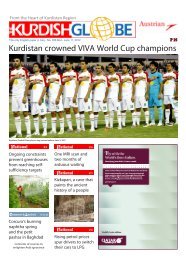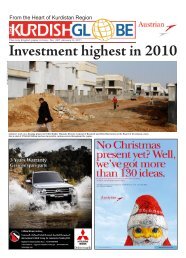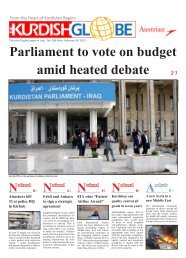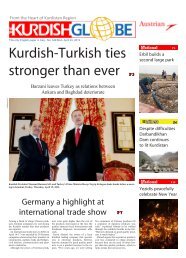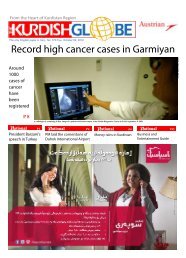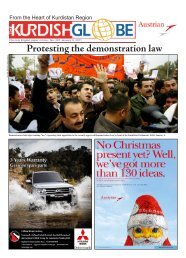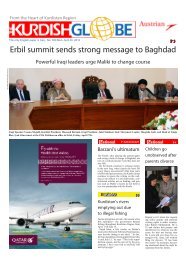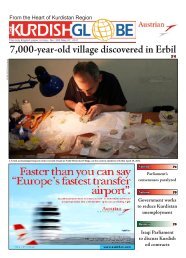The <strong>Kurdish</strong> <strong>Globe</strong> No. 314, Saturday, July 23, 2011 12‘The KRG welcomes South Sudan as the newest nation-state <strong>in</strong> the world’Falah Mustafa, the KRG Head of the Department of Foreign Relations (DFR), told <strong>in</strong> an <strong>in</strong>terview with krg.orgKRG.org: How is the KurdistanRegion represented abroad, <strong>and</strong>is this representation sanctionedby the Iraqi constitutionFMB: Yes, our activities throughour KRG offices abroad are fully<strong>in</strong> accordance with the Iraqi Conscstitution (click here to see a list ofKRG reps). The KRG has ma<strong>in</strong>tcta<strong>in</strong>ed representative offices <strong>in</strong> anumber of significant countriess<strong>in</strong>ce before the fall of the formcmer regime <strong>in</strong> order to promotethe political, economic, cultural<strong>and</strong> educational <strong>in</strong>terests of theKurdistan Region. The KRG hasthe right to ma<strong>in</strong>ta<strong>in</strong> these typesof offices as the st<strong>and</strong><strong>in</strong>g <strong>in</strong>stitutctions of the Kurdistan Region areconstitutionally guaranteed theprerogative to cont<strong>in</strong>ue operat<strong>in</strong>g.The constitution also stipulatesthat federal regions are entitled tohave commercial <strong>and</strong> cultural offcfices with<strong>in</strong> Iraq's embassies.Additionally, as members of afederal Iraq, a number of citizensof the Kurdistan Region work<strong>in</strong> the Iraqi M<strong>in</strong>istry of ForeignAffairs <strong>and</strong> <strong>in</strong> Iraqi embassies.The Iraqi M<strong>in</strong>ister of Foreign Affcfairs, Mr. Hoshyar Zebari, <strong>and</strong> anumber of Iraqi Ambassadors arefrom the Kurdistan Region.KRG.org: How many foreigndiplomatic missions are currentlyactive <strong>in</strong> the Kurdistan Region,<strong>and</strong> do you envision an <strong>in</strong>crease<strong>in</strong> this number?FMB: There are currently 20official foreign missions <strong>in</strong> theKurdistan Region; most of theseare consulates, some are commerccial or representative offices <strong>and</strong>the rest are honorary consulates(click here to view the list of foreceign missions currently operat<strong>in</strong>g<strong>in</strong> the Kurdistan Region). Thereare also a number of local represcsentations of major <strong>in</strong>ternationalorganisations <strong>and</strong> an official offcfice of the United Nations Assistctance Mission to Iraq (UNAMI)<strong>in</strong> the Region. We coord<strong>in</strong>atewith these offices regard<strong>in</strong>g thework of the various UN agencies<strong>and</strong> other organisations to helpthe KRG promote civil societyprograms, human rights, humanitctarian projects, etc.The Palest<strong>in</strong>ian Authority, Italy,the United Arab Emirates, <strong>and</strong>Kuwait have all committed toopen<strong>in</strong>g consulates <strong>in</strong> the Region,<strong>and</strong> Hungary, Bulgaria, <strong>and</strong> Norwcway have all expressed plans tobuild consulates. Additionally,Pol<strong>and</strong> has decided to establish arepresentative office, <strong>and</strong> Belarucus, Lebanon <strong>and</strong> Georgia have allproposed honorary consuls. If thepast couple of years <strong>and</strong> this listare any <strong>in</strong>dicator then there willlikely be many more representatctions open<strong>in</strong>g here <strong>in</strong> the com<strong>in</strong>gyears.KRG.org: What is the primaryfunction of the KRG representattive offices abroad, <strong>and</strong> what istheir relationship with the federalIraqi embassies abroad?FMB: Some countries are partcticularly important to us becauseof our longst<strong>and</strong><strong>in</strong>g relationshipwith them, because of their polclitical <strong>and</strong> economic status, or beccause a significant portion of the<strong>Kurdish</strong> diaspora resides with<strong>in</strong>their borders. With this <strong>in</strong> m<strong>in</strong>d,the primary responsibilities ofour representative offices revolvearound promot<strong>in</strong>g <strong>in</strong>ternationalawareness <strong>and</strong> <strong>in</strong>terest <strong>in</strong> Regionacal politics, culture, economics,bus<strong>in</strong>ess <strong>and</strong> <strong>in</strong>vestment opportuncnities, <strong>and</strong> education. Additionallcly, given the large number of IraqiKurds liv<strong>in</strong>g abroad, the KRGrepresentative offices also assistwith some legal services such asgrant<strong>in</strong>g power of attorney <strong>and</strong>help<strong>in</strong>g to obta<strong>in</strong> legal counsel <strong>in</strong>the Region.The KRG has a healthy <strong>and</strong> cordcdial relationship with the Iraqiembassies abroad, <strong>and</strong> we arework<strong>in</strong>g with the M<strong>in</strong>istry of Foreceign Affairs <strong>and</strong> the federal govecernment <strong>in</strong> Baghdad to f<strong>in</strong>alisethe official parameters of thisrelationship. Ultimately, whilethe KRG representative officesprimarily focus on the <strong>in</strong>terests ofthe Kurdistan Region, we believethat they serve the <strong>in</strong>terests ofIraq as a whole as they encourage<strong>in</strong>ternational awareness, <strong>in</strong>vestmcment <strong>and</strong> assistance.KRG.org: How would you charatacterise the DFR's relationshipwith the federal Iraqi ForeignM<strong>in</strong>istry?FMB: As I mentioned, we enjoyvery good <strong>and</strong> cooperative relatctions with the federal Iraqi M<strong>in</strong>istctry of Foreign Affairs. However,<strong>in</strong> order to discuss this relationscship, we have to first rememberthat Iraq has witnessed a majortransformation. It has changedfrom a centralised authoritarianstate to a federal, democratic <strong>and</strong>pluralistic state. This change isformalized <strong>in</strong> the Iraqi Constitutction which was established by themajority of Iraq's people <strong>in</strong> the2005 referendum. The constitutction states that Iraq is a federalstate, <strong>and</strong> we underst<strong>and</strong> this tomean that the federal regionsshare both power <strong>and</strong> wealth withthe central federal government.Of course it is not easy to workout such a dramatic change, <strong>and</strong> ittakes time, patience, coord<strong>in</strong>ation<strong>and</strong> cooperation.With this <strong>in</strong> m<strong>in</strong>d, we believethat this relationship is key toour long-term future as a federalstate, <strong>and</strong> we believe that we areable to serve the <strong>in</strong>terests of boththe Kurdistan Region <strong>and</strong> Iraq asa whole through our coord<strong>in</strong>ationwith the federal M<strong>in</strong>istry. Accordic<strong>in</strong>gly, we are committed to ma<strong>in</strong>tcta<strong>in</strong><strong>in</strong>g a positive <strong>and</strong> professcsional work<strong>in</strong>g relationship withthe federal M<strong>in</strong>istry of ForeignAffairs. We ma<strong>in</strong>ta<strong>in</strong> a directoratewith<strong>in</strong> DFR whose primary rescsponsibility is to coord<strong>in</strong>ate withthe Foreign M<strong>in</strong>istry <strong>in</strong> Baghdcdad <strong>and</strong> with the Iraqi embassiesabroad, <strong>and</strong> we cont<strong>in</strong>ue work<strong>in</strong>gto strengthen this relationship. Wecooperate <strong>in</strong> the areas of visit<strong>in</strong>gforeign delegations, <strong>in</strong>ternationaltra<strong>in</strong><strong>in</strong>g programmes for ourdiplomats, Iraqi activities at theUnited Nations <strong>and</strong> many otherimportant projects.KRG.org: How would you charatacterise the KRG's relationshipswith its neighbours, <strong>in</strong> particularIran <strong>and</strong> Turkey?FMB: To beg<strong>in</strong> with it is importctant to clarify that as part of Iraq,the KRG is committed to Iraq'sfederal foreign policy. Accord<strong>in</strong>glcly, we aspire to have relationshipsbased on mutual underst<strong>and</strong><strong>in</strong>g,mutual respect, <strong>and</strong> mutual benecefit. We pursue a policy of non<strong>in</strong>terference<strong>in</strong> the <strong>in</strong>ternal affairsof neighbour<strong>in</strong>g countries, <strong>and</strong> wepromote bus<strong>in</strong>ess, <strong>in</strong>vestment <strong>and</strong>trade relations <strong>and</strong> the security ofour <strong>in</strong>ternational borders.That be<strong>in</strong>g said, our relationscships with our neighbors aregood. Turkey did more than $7billion worth of bus<strong>in</strong>ess withIraq last year, <strong>and</strong> $4.5 billionof that was with<strong>in</strong> the Kurdistctan Region. There are currently35,000 Turkish workers <strong>in</strong> theRegion perform<strong>in</strong>g jobs rang<strong>in</strong>gfrom teach<strong>in</strong>g <strong>in</strong> private schoolsto mann<strong>in</strong>g the huge constructction projects that are develop<strong>in</strong>gthroughout the Region. The Turkicish Prime M<strong>in</strong>ister Recep TayyipErdo?an recently made a historicvisit to the Region which showsan important shift toward engagemcment <strong>in</strong> their policy regard<strong>in</strong>g theKurdistan Region. Both Turkey<strong>and</strong> Iran have opened consulates<strong>in</strong> Erbil (Iran has one <strong>in</strong> Suleimancniah also), <strong>and</strong> we frequently excchange official visits with seniorrepresentatives from both countctries. We also conduct billions ofdollars worth of trade with Iranevery year, <strong>and</strong> we are committedto cont<strong>in</strong>u<strong>in</strong>g to develop positiverelations with all of our neighbcbours.KRG.org: You stated that theKurdistan Region is committed todevelop<strong>in</strong>g positive relations withits neighbors; has Iran's recentshell<strong>in</strong>g of the <strong>Kurdish</strong> borderregions affected the KRG's relattions with Iran?FMB: The shell<strong>in</strong>g by the Islamicic Republic of Iran is unacceptacable, <strong>and</strong> it is a violation of Iraq'ssovereignty. These actions havedone a lot of damage to villagesalong the border, <strong>and</strong> they haveforced a lot of people to evacuate.The Kurdistan Region's Presidcdent, Masoud Barzani, has condcdemned these attacks <strong>and</strong> calledon Iran to work together to f<strong>in</strong>d apeaceful solution. The defense ofIraq's borders is the responsibilityof the Iraqi federal government,<strong>and</strong> we have seen steps <strong>in</strong> the lastfew days where the various polclitical blocs have come togetherto condemn Iran's actions as well.We believe that dialogue is thebest way to resolve these typesof disputes, <strong>and</strong> we hope the Irancnian government will respect thesovereignty of Iraq's borders; butthese actions will have a negativeeffect on our relations if they donot end. We urge the Iranian govecernment to put an end to these unwcwarranted acts which do not helpbr<strong>in</strong>g about the goal of security<strong>and</strong> stability <strong>in</strong> the border areas<strong>and</strong> work aga<strong>in</strong>st the developmcment of normal relations betweenthe Kurdistan Region <strong>and</strong> the Islclamic Republic of Iran.KRG.org: Do you see an <strong>in</strong>ctcrease of <strong>in</strong>ternational compantnies <strong>and</strong> <strong>in</strong>vestors <strong>in</strong>terested <strong>in</strong>com<strong>in</strong>g to the Kurdistan Region?FMB: Without a doubt; anyonewho follows events <strong>in</strong> the Regcgion can tell you that it has madetremendous political, economic,social <strong>and</strong> educational progress<strong>in</strong> recent years, <strong>and</strong> it has provento be a consistently stable <strong>and</strong> seccure environment <strong>in</strong> which thisprogress will easily be susta<strong>in</strong>ed.Comb<strong>in</strong>ed with a generous foreceign <strong>in</strong>vestment law, this environmcment has been key to the growthof foreign direct <strong>in</strong>vestment <strong>and</strong>to the <strong>in</strong>crease <strong>in</strong> the number ofcountries <strong>and</strong> companies that partcticipate <strong>in</strong> the Erbil InternationalTrade Fair for many years now.The Erbil Fair is the largest geneceral trade fair <strong>in</strong> Iraq. This year'sfair is due to take place from 24-27 October. It will cover a largevariety of economic sectors, <strong>and</strong>it is supported by a large numbcber of trade promotion agencies,chambers of commerce, tradeassociations, m<strong>in</strong>istries <strong>and</strong> embcbassies. We anticipate that it willattract around 1000 exhibitorsfrom over 30 countries around theworld this year.KRG.org: There are a significtcant number of Iraqi <strong>Kurdish</strong> asyltlum seekers <strong>in</strong> Europe <strong>and</strong> abroadthat are supposed to be deported.Has the Kurdistan Regional Goveternment been a part of any of thedecisions regard<strong>in</strong>g their forcedrepatriation, <strong>and</strong> is the KRG provtvid<strong>in</strong>g these asylum seekers withany help?FMB: The KRG has alwayshad a clear stance regard<strong>in</strong>g thismatter. We have always said thatwe welcome the return of thesepeople by their own free will;those who are ready <strong>and</strong> willic<strong>in</strong>g to return are encouraged tocome <strong>and</strong> be a part of the rebuildic<strong>in</strong>g process of their country. Weunderst<strong>and</strong> that many of thesepeople have lost everyth<strong>in</strong>g thatthey own <strong>in</strong> order to start a newlife abroad, <strong>and</strong> we have workedhard to communicate their situatction to the countries <strong>in</strong>volved. Wehave argued that this is a humanitctarian issue before it is a politicalor any other k<strong>in</strong>d of issue, <strong>and</strong> wehave therefore asked that theirsuffer<strong>in</strong>g be considered whentheir host countries make policiesthat affect them. We have askedthat these <strong>in</strong>dividuals be able todecide for themselves regard<strong>in</strong>gtheir country of residence. Wehave not been, <strong>and</strong> we will notbe, a part of any private or publicagreement that will disadvantageour people whether they live hereor abroad.Hav<strong>in</strong>g said this, it is importantto recognise that each nation hasits own laws <strong>and</strong> <strong>in</strong>terests to protctect regard<strong>in</strong>g immigration, <strong>and</strong>they ultimately have to make theirown decisions regard<strong>in</strong>g thoselaws <strong>and</strong> <strong>in</strong>terests. Furthermore,the Kurdistan Region is not an <strong>in</strong>dcdependent state, <strong>and</strong> as such, weare limited <strong>in</strong> our ability to disscsuade the federal government <strong>in</strong>Baghdad from enter<strong>in</strong>g <strong>in</strong>to thesek<strong>in</strong>ds of agreements.However, we cont<strong>in</strong>ue to ask forpatience on all sides, <strong>and</strong> we askfor these nations to revisit this impcportant issue once aga<strong>in</strong> <strong>and</strong>, conscsider<strong>in</strong>g its humanitarian nature,to f<strong>in</strong>d a satisfactory solution toit. In the end, whatever decisionsare made, the KRG will do what itcan to assist any forced returneesas they make the transition back<strong>in</strong>to local society.KRG.org: Recently, we haveseen conflict<strong>in</strong>g statements fromthe various political blocs <strong>in</strong>Baghdad about the withdrawalof US troops from Iraq. What isthe KRG's position regard<strong>in</strong>g theplanned withdrawal?FMB: To beg<strong>in</strong> with, it's impcportant for me to clarify that thisquestion has to be decided by thecollective groups of the federalgovernment <strong>in</strong> Baghdad. Howecever, it is essential that they beable to leave politics aside <strong>and</strong>determ<strong>in</strong>e whether the Iraqi securcrity forces are ready <strong>and</strong> capableof ma<strong>in</strong>ta<strong>in</strong><strong>in</strong>g security with<strong>in</strong>Iraq while defend<strong>in</strong>g its <strong>in</strong>ternatctional borders, its airspace <strong>and</strong> itsnavigable waterways. The safety<strong>and</strong> security of the people of Iraqshould be paramount <strong>in</strong> answeric<strong>in</strong>g this question, <strong>and</strong> the rema<strong>in</strong>ic<strong>in</strong>g vacancies of the federal govecernment's top security positions<strong>and</strong> the recent tensions betweenthe different political groups <strong>in</strong>Baghdad raise doubts that the seccurity forces are capable of thesetasks.There are also a number of unrcresolved issues <strong>in</strong> Iraq that shouldbe taken <strong>in</strong>to consideration, suchas the status of the disputed terrcritories, implement<strong>in</strong>g a nationalcensus, as well as the passage ofboth revenue shar<strong>in</strong>g <strong>and</strong> hydroccarbons laws. If these issues remcma<strong>in</strong> unresolved they are likelyto lead to <strong>in</strong>creased tensions <strong>and</strong>possibly to violence, <strong>and</strong> it is vitctal that these issues be addressed<strong>in</strong> order to show that Iraq haschanged from a centralised autcthoritarian state to a democratic,federal <strong>and</strong> pluralistic one. Thepeople of the Kurdistan Regionwould like for these issues to beresolved peacefully, <strong>and</strong> I th<strong>in</strong>kit's safe to say that the presence ofAmerican troops could help enscsure the security <strong>and</strong> stability ofthe country dur<strong>in</strong>g this process.KRG.org: As you know, SouthSudan just became the newestmember of the <strong>in</strong>ternational commtmunity as an <strong>in</strong>dependent counttry. Do you have any commentsregard<strong>in</strong>g this historic developmtment?FMB: The KRG welcomesSouth Sudan as the newest nationstate<strong>in</strong> the world. Their struggleonce aga<strong>in</strong> proves the historicaltruth that noth<strong>in</strong>g can stop thewill of the people to better theirfuture <strong>and</strong> enjoy their full rightsas free citizens. We congratulatethem, <strong>and</strong> we wish them success<strong>in</strong> this huge endeavour. Buildic<strong>in</strong>g a country is not an easy task,<strong>and</strong> they will certa<strong>in</strong>ly face manychallenges, but we st<strong>and</strong> withthem <strong>in</strong> the belief that freedomwill make these challenges worthfac<strong>in</strong>g. Additionally, I th<strong>in</strong>k that itis important to po<strong>in</strong>t out that afterfive decades of conflict, war wasultimately not able to solve thisproblem. Ultimately, it was onlypeace <strong>and</strong> negotiation that wasable to br<strong>in</strong>g about this permancnent solution, <strong>and</strong> we commendthe government of Sudan for havic<strong>in</strong>g the courage to support thisdecision.
The <strong>Kurdish</strong> <strong>Globe</strong> No. 314, Saturday, July 23, 2011 13Grabb<strong>in</strong>g the bull by the horns:tackl<strong>in</strong>g <strong>Kurdish</strong> unemploymentBy Swara KadirSwara7kadir@aol.comUnemployment <strong>in</strong> Kurdistanhas become a problem thatcannot be ignored any longer.The lack of reliable statisticscont<strong>in</strong>ues to pose a problem<strong>in</strong> gett<strong>in</strong>g the facts straight,but <strong>in</strong> 2008 the Kurdistan Regcgional Government's M<strong>in</strong>istryof Plann<strong>in</strong>g estimated unempcployment at 15 percent. Thatestimate was most likely basedon people who didn't have anyjob at all <strong>in</strong> the public sector orotherwise. Unofficial statisticsrate unemployment at 50 perccent, which <strong>in</strong>cludes peoplewho are hired by the governmcment but are not “work<strong>in</strong>g” oremployed as active, productiveemployees, so it's called “hiddcden” or “covered” unemploymcment. Today <strong>in</strong> Kurdistan thereare more than 1 million publicsector employees.It's estimated that more than60 percent of the entire Kurdicistan Regional Governmentbudget goes to pay<strong>in</strong>g thoseburdensome salaries, which isbleed<strong>in</strong>g the economy dry. Itis creat<strong>in</strong>g a huge nanny statethat pretends to be productctive. Dar<strong>in</strong>g steps are neededto tackle this problem from theroot; a look back at Germany'shistory may provide some <strong>in</strong>scspiration. Without real change<strong>in</strong> the current economic policy,unemployment will cont<strong>in</strong>ueto spread like cancer, crippl<strong>in</strong>gthe nascent <strong>Kurdish</strong> economy.It’s a sorry sight to go to somegovernment departments thatprovide citizen services, partcticularly public sector banks.You will see a number of empcployees sitt<strong>in</strong>g there, do<strong>in</strong>gnoth<strong>in</strong>g, while only a few areactively work<strong>in</strong>g. This is havic<strong>in</strong>g an adverse effect, destroyic<strong>in</strong>g motivation other staff mayhave to work <strong>and</strong> be productctive. Despite the large numberof government employees <strong>in</strong>the different departments, partcticularly the ones that deal withservices <strong>and</strong> citizen needs, theyare bureaucratic <strong>and</strong> <strong>in</strong>effectctive, with lots of red tape thatneeds cutt<strong>in</strong>g before anyth<strong>in</strong>gis achieved. L<strong>in</strong>es are long,frequent mistakes are made oncitizens' official paperwork,files get lost. Gett<strong>in</strong>g nationalidentification takes weeks ofgo<strong>in</strong>g back <strong>and</strong> forth betweendifferent departmental offices,filled with employees whodon't get the job done. It’s asorry state, <strong>and</strong> so far noth<strong>in</strong>geffective has been done aboutit.Even the idea of reliev<strong>in</strong>g theextra government employees ofNumber of unemployed people sitt<strong>in</strong>g on the side of an Erbil Downtown street <strong>in</strong> this file photo.their jobs would cause severediscontent <strong>and</strong> disenchantmentwith the government <strong>and</strong> couldlead to riots. This is no wondcder when a person's livelihoodis under threat. What makesth<strong>in</strong>gs worse is the currentwave of public discontent thathas spread <strong>in</strong> the Middle East<strong>and</strong> caught on <strong>in</strong> Kurdistan,although street demonstrationshave stopped, but it's quitelikely a government <strong>in</strong>itiativeto lay off large numbers ofgovernment employees wouldcause unrest <strong>and</strong> riot<strong>in</strong>g. TheKRG may be fac<strong>in</strong>g or a deadend, were it seems impossibleto release government fundsfor pay<strong>in</strong>g unnecessary salarcries. Cont<strong>in</strong>u<strong>in</strong>g with the currcrent situation is not a smartoption either, wast<strong>in</strong>g all thatgovernment money pay<strong>in</strong>g fora huge unproductive publicsector is go<strong>in</strong>g to cripple the<strong>Kurdish</strong> economy <strong>and</strong> lead it<strong>in</strong>to a fiscal storm.Recently, KRG announcedthe creation of 5,000 new“government” job opportunitcties, target<strong>in</strong>g the young joblcless graduates who are beccom<strong>in</strong>g disillusioned with thegovernment <strong>and</strong> what the futcture holds for them <strong>in</strong> terms ofcareer. This type of <strong>in</strong>itiativeis unfortunately not tackl<strong>in</strong>gthe problem at the root as itonly serves to <strong>in</strong>flate the publclic sector with even more unwcwanted, non-produc<strong>in</strong>g publicemployees. Ironically what isneeded is a real welfare systemthat is a sort of a confession oracknowledgment there is unecemployment <strong>in</strong> Kurdistan, defcf<strong>in</strong><strong>in</strong>g the unemployed personas just that, not giv<strong>in</strong>g thema fake public sector job thatis not needed <strong>and</strong> only compcplicates matters even more.Thankfully, some steps havealready been taken <strong>in</strong> that dircrection, the M<strong>in</strong>istry of Labor<strong>and</strong> Social Affairs has starteda project of provid<strong>in</strong>g welfarepayments of 150,000 Iraqi d<strong>in</strong>cnars to graduates who haveproven that they cannot f<strong>in</strong>demployment anywhere. Thesegraduates are then deemed offcficially unemployed.From there, it's easier to dealwith the unemployment problclem by channel<strong>in</strong>g them to aone-stop shop. A procedurecan be set up where the officcially unemployed person goesthrough an employment centcter, which hasn't been createdyet. It's a much-needed areathat hasn't been thoroughly expcplored. The employment centcter can collate <strong>and</strong> gather job<strong>in</strong>formation from the two sectctors <strong>and</strong> use that <strong>in</strong>formation tof<strong>in</strong>d a job for the unemployedperson accord<strong>in</strong>g qualificatctions, skills <strong>and</strong> preferences.Such a center has proven itsworth <strong>in</strong> many countries <strong>and</strong>is an efficient tool not <strong>in</strong> eradiccat<strong>in</strong>g unemployment compcpletely, but rather <strong>in</strong> mak<strong>in</strong>gsure that every job vacancyis filled. This is categoricallynot happen<strong>in</strong>g right now <strong>in</strong>the <strong>Kurdish</strong> public <strong>and</strong> privatesector job market.In more advanced economcmies, a nanny state is avoidedby nourish<strong>in</strong>g <strong>and</strong> encouragic<strong>in</strong>g the private sector to hirepeople, pay them money <strong>and</strong>get them off the government'sback. Those countries wouldhave a sizable private sectctor that can absorb a work<strong>in</strong>gpopulation, giv<strong>in</strong>g it jobs <strong>and</strong>mak<strong>in</strong>g it productive or facebe<strong>in</strong>g fired. The private sector<strong>in</strong> any country is its economiclifel<strong>in</strong>e; no country was bornwith a thriv<strong>in</strong>g private sectorthat came out of the blue. Rathecer it started off small <strong>and</strong> grewlarger, to the extent of hav<strong>in</strong>ggigantic mult<strong>in</strong>ationals <strong>in</strong> fullyfledged free market economieslike the U.S., for want of a bettcter example, were corporationsare a little less than a state <strong>in</strong> itscself like Microsoft corporationthat is hir<strong>in</strong>g around 90,000employees.Can Kurdistan's privatesector face the challenge ofabsorb<strong>in</strong>g hundreds of thouscs<strong>and</strong>s of extra unproductivegovernment employees? Rightnow, the answer would mostdef<strong>in</strong>itely be <strong>in</strong> the negative.Although burgeon<strong>in</strong>g entrepcpreneurial activity is start<strong>in</strong>gto make an appearance, rightPRESS PHOTOnow it is not equipped or readyto deal with the serious hiddenunemployment problem Kurdicistan is fac<strong>in</strong>g. Given that theprivate sector of any countryneeds time to grow <strong>and</strong> developto be a realistic alternative tothe public sector as an employmcment base, the <strong>Kurdish</strong> privatesector needs a major steroid<strong>in</strong>jection from the governmentto make it strong enough toface the challenge. The succcessful Asian Tiger economieswere <strong>in</strong>itially able to create agrow<strong>in</strong>g private sector throughheavy state <strong>in</strong>tervention thatsupported sizable manufacturic<strong>in</strong>g <strong>in</strong>dustries.Is there another alternative?What did Adolf Hitler do todeal with Germany's postWorld War I gigantic unempcployment problem? For obviocous reasons, despite the manyreservations the writer hasabout us<strong>in</strong>g the Nazi Germanregime as an example, there issometh<strong>in</strong>g useful to learn fromthe way this dictator dealt withthe problem that Kurdistan isfac<strong>in</strong>g at h<strong>and</strong>. Hitler boldlycreated huge national serviceprojects that required thouscs<strong>and</strong>s upon thous<strong>and</strong>s of laborecers, both skilled <strong>and</strong> unskilled.The sprawl<strong>in</strong>g Autobahns orsuper highways of Germanyare the outcome of Hitler'seconomic solution to Germancny's unemployment problem.What he gave the Germanpeople was a job <strong>and</strong> a natctional purpose that boosted theGerman people's morale. "Thebest possible way to br<strong>in</strong>g theGerman people back <strong>in</strong>to workis to set German economic lifeonce more <strong>in</strong> motion throughgreat monumental works,"said Hitler.Kurdistan is suffer<strong>in</strong>g fromhidden <strong>and</strong> cyclical unemploymcment, an undeniable fact thatneeds to be faced head on <strong>and</strong>dealt with — no half measures<strong>and</strong> temporary fixes. Innovatctive dar<strong>in</strong>g steps are yet to betaken by the government todeal with this problem from thesource rather than just work ondamage limitation <strong>and</strong> quickfixes. History, German history<strong>in</strong> this case, has someth<strong>in</strong>g toteach us. Employment centers<strong>in</strong> Kurdistan can br<strong>in</strong>g laborsupply <strong>and</strong> dem<strong>and</strong> together.This will br<strong>in</strong>g the <strong>Kurdish</strong>economy a step closer frombe<strong>in</strong>g a petro dollar consum<strong>in</strong>geconomy to an efficient, prodcduc<strong>in</strong>g economy.



